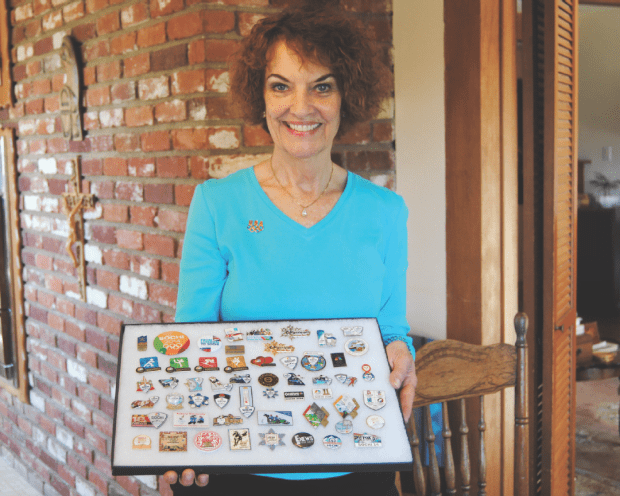
Nearly every other year for 30 years, Malibu local Pam Litz has traveled to yet another corner of the world to join in the international spirit of the Olympic Games. But Litz is no mere spectator. She engages in her own sort of sport: Pin trading.
A retired teacher, Litz began trading pins at the 1984 Olympics in Los Angeles. She lived in Westchester at the time and was working as a volunteer.
During the opening ceremony, she saw people trading pins and decided she wanted to get involved, so she bought four pins.
“The first trade I made was with a wrestling coach from Korea,” she said. “He traded me for one of the L.A. ’84 pins that I bought for a pin from Seoul, Korea. The games were going to be there in 1988, so I thought that was cool. First of all, I’m talking to this coach who I never would have met otherwise, and that was my first trade and I was just hooked.”
Since 1984, she has traveled to 13 different Olympic Games to trade pins, including Barcelona, Calgary, Atlanta, Sydney, Beijing, London and Sochi. During that time, she has collected more than 7,000 pins.
According to Litz, pin trading is popular among Olympic attendees, from spectators to coaches to athletes. Over the course of the Games, traders can purchase pins displaying flags from participating countries, sponsor logos or Olympic mascots, and trade pins with anyone they encounter.
The pins are often limited edition lapel pins, and produced as collectors’ items. The rarer the pins, the better the condition and the quality of design (pins produced in Italy, Hungary and the Czech Republic are high-quality, according to pins.com) mean higher value.
While in Sochi, Litz worked with Coca Cola in a pin-trading center the company facilitates to promote friendly and fair pin trading, an opportunity she first received in the ‘90s through her membership in the Olympin Club, a national organization devoted to Olympic pin trading.
“[Coca-Cola has] some of us who have been doing this for a long time as their experts, who set up pins on a table and then kind of explain the whole process and give [people] the opportunity to make their first trades and so forth,” Litz said.
Litz often coordinates her travels to the Olympics with friends, both pin traders and non-pin traders, and uses the time to reconnect with old friends and make new friends. She has traveled with Wendy Brooks, a friend since they both began teaching at Hawthorne High in 1967, to seven games, including Los Angeles in 1984. Brooks also trades pins, but said her interest doesn’t match Litz’s.
“[Pin trading] has become a passion with [Pam] because of the feeling you get when you’re trading,”
Brooks said. “She’s a very kind person and it’s a way to connect when you don’t have hours to have a discussion in a pub, and now you’ve made a connection in a short amount of time.”
Litz rarely sells her pins, as many traders do, but rather, she keeps her pins pristine in display cases. Nearly every pin has a story.
Buried among her pins from Sochi is a rectangular gold pin about the size of a small battery, displaying the red and green flag of Belarus. Hidden in the upper corner, barely distinguishable, are the signature Olympic rings.
“I met this guy up in the mountains of one of the venues, and he really wanted to trade and I thought it was a pretty pin, but I didn’t think it was Olympic, so I thought I’ll just trade to be nice,” Litz said. “Then I got back and looked at it more carefully and saw that it was the [Olympic] rings on it. That’s really special.”
When she’s not trading pins, Litz spends her time volunteering at Our Lady of Malibu and in the community.
She’s always planning her next pin-trading trip, though. Plans are already underway for her trips to the 2015 Pan American Games in Toronto and, of course, to the 2016 Olympics in Rio de Janeiro. She said she plans to attend every Olympic Games for as long as she can.
“It gives you a great opportunity to meet other people, not just Olympic people, but the people from the country, and you realize just how much everybody is the same,” Litz said. “They all want to be happy and have a good time and just enjoy life and it gives you a very positive feeling toward the world and the people in it.”
